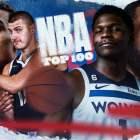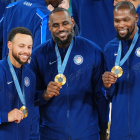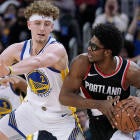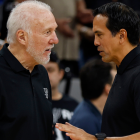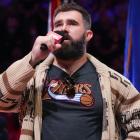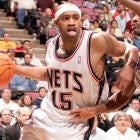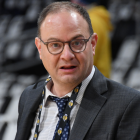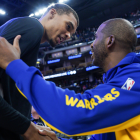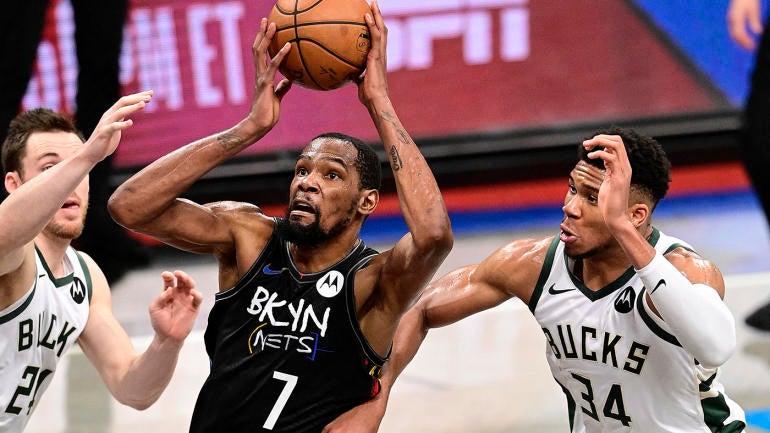
NEW YORK -- For one game at least, the Brooklyn Nets' three-headed monster has been reduced to a mere monocephalic superhero. Four days after the Nets coulda, shoulda taken a 3-0 lead against the Milwaukee Bucks in their second-round series, they are in danger of falling down 3-2, with Kyrie Irving and James Harden reduced to spectators.
That means it's up to Kevin Durant to save the day. Right?
"We try to stick with our principles and our fundamentals, which is connectivity, competitive spirit, embracing the opportunity and going out there and playing together as a team," Brooklyn coach Steve Nash said on Monday. "This does not fall on Kevin, this falls on the Nets."
Oh. But Durant will approach this game differently than normal, won't he? He'll essentially be playing point guard and running high pick-and-rolls over and over again ... right?
"I picture me doing everything out there, just like I do every night," Durant said. "Some more than others. I might have to handle the ball more, I might have to post up more, come off pindowns more. I just gotta be prepared to do everything out there. Just like any night."
Nash also said that "we have to play the way that we've played for the most part this season." Durant added that "it's just basketball" and their mentality offensively is "go out there and just hoop." If you were not familiar with the Nets' stated philosophy and hadn't been monitoring their media sessions all season, you might have thought Nash and Durant were being ridiculous. How could they expect anyone to believe that any team can lose two All-Stars and not change the way they play? They don't actually believe that, do they?
Yes and no. Brooklyn's offense is fundamentally different when it has one star on the floor rather than two or three. At times on Tuesday, it will have zero. Nash said the reality is that, when everyone's available, the Nets can lean more heavily on isolations and mismatch-hunting in order to create an advantage. "When less are available," he said, "the balance shifts a little bit." The way he and Durant framed it, though, makes sense in the context of this particular team. Partially by design, but mostly out of necessity, Brooklyn has made adaptability a central part -- perhaps the central part -- of its identity.
The Big 3 played 202 minutes together in the regular season, a stat cited so frequently that I no longer have to look it up. Durant played more 19 more minutes as the lone lead playmaker (i.e. without Irving, Harden, the injured Spencer Dinwiddie or former Net Caris LeVert), but it's unlikely that anyone on the roster cares about that kind of thing. When the Nets were healthy for their first-round series against the Boston Celtics, the first time that Durant, Irving and Harden played five consecutive games together, they used a starting lineup that didn't log a single minute before the playoffs. Seven weeks ago, in an interview for a story about positionless basketball, Bruce Brown suggested that adjusting to different lineups is far less complicated than people make it seem.
"Literally, everybody just go out there and do what they do," Brown said. "I think the role players on the team know their role. We won't try to do anything extra. We're just going to do what the game needs us to do. So, yeah, everybody just goes out there and plays, has fun. If you're open, shoot the shot. If you're not, swing the ball."
This does not mean that Brooklyn will simply roll the ball out and hope for the best in Game 5. It's just that, at this point, you know where all of your teammates are most effective, and, as Durant said, you know the opposing players' strengths and weaknesses and how you want to attack them.
In this case, you can expect a heavy dose of high ball screens for Durant.
Regardless of whether Brook Lopez is in a deep drop or he ventures up higher, as he did several times on Sunday, the Nets will target him. They'll go after Bryn Forbes and Bobby Portis, too, but they don't want the offense to be as predictable as it became in Game 4. Fortunately, Durant's singular skill set allows them to mix it up. They can put him in the post, have him come off pindowns and use him as a screener.
They can also run sets for other guys. Another way to exploit the drop is to run Joe Harris and Landry Shamet off stagger screens or Chicago action (i.e. a pindown into a dribble-handoff):
"We definitely want to play through Kevin," Nash said. "We want Kevin to have a big imprint on the game. But it's a team effort. Everyone has to pitch in."
Blake Griffin can operate in the post and as a point forward of sorts. Mike James was too wild in Game 4, but gave Brooklyn a spark as a playmaker before that. One subplot is whether or not Nash, a Hall of Fame point guard, will be willing to go without a traditional point guard for extended stretches. Tyler Johnson got some non-garbage-time run after Irving's injury, and, if Brooklyn gets disorganized, Chris Chiozza is another option. I wouldn't be surprised, though, if Nash started Durant, Harris, Brown, Griffin and Jeff Green.
However the Nets are configured, Irving's absence means they will have far less margin for error than they're used to. They'll need to be significantly sharper than they were in Milwaukee, and they're almost certainly not going to find the easy rhythm they had the last time they played at Barclays Center. It's difficult to paint their predicament as anything other than a nightmare scenario, but if there's any silver lining to be found it is this: Even with three of the best one-on-one scorers in the history of the game on the roster, every step of the way the coaching staff preached pace, movement and the importance of making every player a threat. In this state, playing that way is their only hope.










